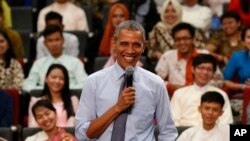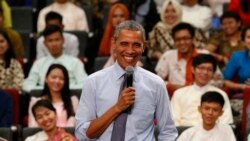In Southeast Asia, the United States believes that accountable governments, the rule of law, and respect for human rights provide the foundation for long-term political stability and sustainable development. By promoting these values the United States is encouraging governments to allow and protect outlets for peaceful expression and to seek the most enduring source of legitimacy and stability: the consent of the governed.
Independent civil society is critical to promoting democracy. In Southeast Asia, the U.S. works closely with civil society through initiatives like the Young Southeast Asian Leaders Initiative. Countries such as Indonesia, the Philippines, and Malaysia have some of the most vibrant and diverse civil societies in the world.
However, the region has not been immune to a worldwide trend of government restrictions on civil society. One example is Thailand, where the military regime has sharply restricted civil liberties since seizing power in May 2014. Next door, the Cambodian government has also pushed through legislation restricting the ability of nongovernmental organizations to operate freely.
Open and transparent government is critical to advance both democracy and development. For example, in the Philippines, the government required grassroots participation in the planning and budgeting of poverty-reduction programs in every one of its municipal and provincial governments. That requirement has resulted in better quality programs.
Access to information is the third element in America's democracy promotion strategy. In Southeast Asia, Internet access and usage have sky rocketed. A free and open Internet as well as an independent press is instrumental in rooting out corruption and increasing government accountability.
At the same time, the United States is troubled by backsliding on freedom of expression issues in recent months in the region. In Malaysia, officials have tightened restrictions on freedom of expression, and government critics are now victims of charges under Malaysia’s Sedition Laws.
And in countries like Vietnam, many journalists and online activists continue to suffer harassment or remain in prison for peacefully expressing their views.
The United States will continue to support the people of Southeast Asia as they seek to strengthen democratic governance and protect and promote universal human rights.






